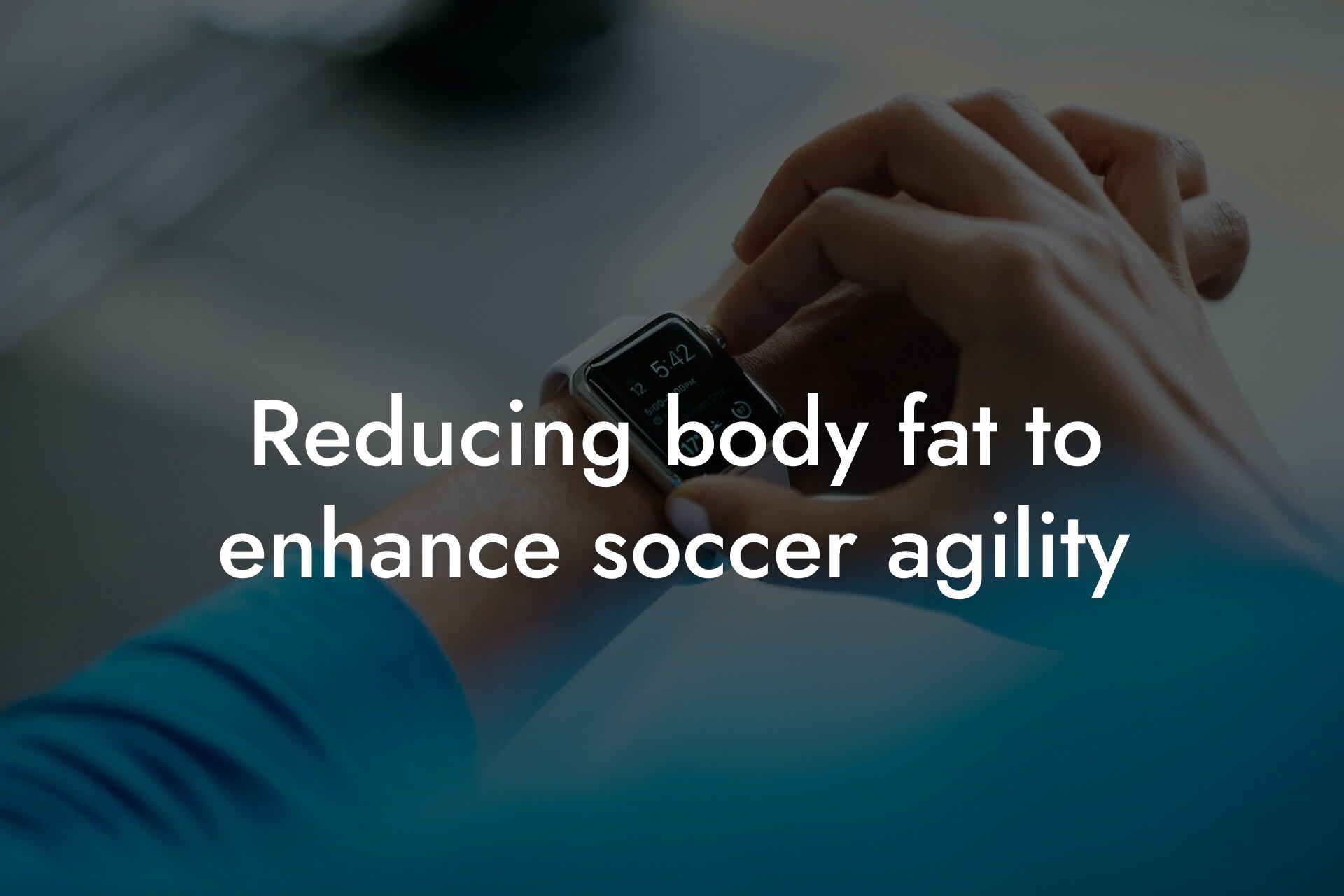As a high-earning professional, you understand the importance of maintaining a healthy and strong physique to perform at your best on the soccer field. While many factors contribute to your overall performance, bone density plays a critical role in preventing injuries that can sideline you for weeks or even months. In this article, we'll delve into the significance of bone density in soccer, how it affects your risk of injury, and what you can do to maintain strong bones.
Table of Contents
What is Bone Density?
Bone density refers to the measure of the amount of minerals, such as calcium and phosphorus, present in your bones. It's an indicator of bone strength and density, which affects your susceptibility to fractures and osteoporosis. Peak bone density is typically reached in early adulthood, and it naturally declines with age. However, a sedentary lifestyle, poor nutrition, and certain medical conditions can accelerate bone loss, leading to weaker bones.
Why is Bone Density Important in Soccer?
Soccer is a high-impact sport that involves rapid movements, jumps, and collisions, which can put immense stress on your bones. Weaker bones are more prone to fractures, stress fractures, and osteoporosis, which can significantly impact your performance and longevity in the sport. In fact, studies have shown that soccer players with lower bone density are more likely to suffer from injuries, particularly in the legs, hips, and spine.
The Risks of Low Bone Density in Soccer
Low bone density can increase your risk of various injuries, including:
• Stress fractures: Weakened bones are more susceptible to stress fractures, which can occur due to repetitive stress and overuse.
• Osteoporosis: This condition causes brittle and porous bones, making them more prone to fractures, particularly in the hips, spine, and wrists.
• Fractures: Low bone density can increase the risk of fractures, which can be debilitating and require extended periods of recovery.
• Chronic pain: Weakened bones can lead to chronic pain, which can affect your performance and overall quality of life.
How to Maintain Strong Bones for Soccer
Maintaining strong bones requires a combination of proper nutrition, regular exercise, and lifestyle changes. Here are some tips to help you keep your bones strong:
• Calcium and vitamin D intake: Ensure you consume adequate amounts of calcium and vitamin D through your diet or supplements. These nutrients are essential for bone growth and density.
• Resistance training: Engage in regular resistance exercises, such as weightlifting, to strengthen your muscles and bones.
• High-impact exercises: Incorporate high-impact exercises, like jumping and running, into your training routine to stimulate bone growth.
• Proper hydration: Drink plenty of water to keep your bones and muscles hydrated and healthy.
• Reduce caffeine and alcohol: Limit your consumption of caffeine and alcohol, which can interfere with calcium absorption and bone health.
DEXA Scans for Bone Density Measurement
A Dual-Energy X-ray Absorptiometry (DEXA) scan is a non-invasive, painless test that measures bone density. At Tano Performance Group, we use state-of-the-art DEXA machines to provide you with a comprehensive body assessment, including bone density measurements. This information helps you identify areas for improvement and develop a personalized plan to optimize your bone health and overall performance.
Bone density plays a critical role in preventing soccer injuries and maintaining optimal performance. By understanding the importance of bone density, recognizing the risks of low bone density, and taking proactive steps to maintain strong bones, you can reduce your risk of injury and stay ahead of the competition. At Tano Performance Group, we're committed to providing you with the tools and expertise you need to achieve your goals and take your performance to the next level.
Take the First Step Towards Optimal Performance
Don't let bone density hold you back from achieving your goals. Schedule a DEXA scan with Tano Performance Group today and take the first step towards optimal performance and a healthier, stronger you.
Frequently Asked Questions
What is bone density and why is it important for soccer players?
Bone density refers to the amount of minerals, such as calcium and phosphorus, in your bones. It's an important factor in determining the strength and durability of your bones. For soccer players, maintaining healthy bone density is crucial as it can help prevent injuries, particularly those related to osteoporosis and fractures. A higher bone density can also improve overall athletic performance and reduce the risk of long-term health problems.
How does bone density affect soccer performance?
Bone density plays a significant role in soccer performance as it directly impacts the strength and resilience of your bones. With healthy bone density, you'll be able to perform at a higher level, with increased speed, agility, and power. On the other hand, low bone density can lead to fatigue, decreased performance, and a higher risk of injury.
What are the common soccer injuries related to bone density?
Some common soccer injuries related to bone density include stress fractures, osteoporosis, and bone bruises. These injuries can be debilitating and may require extended periods of rest and recovery. In severe cases, they can even lead to long-term health problems and affect your overall quality of life.
How can soccer players improve their bone density?
There are several ways soccer players can improve their bone density, including a balanced diet rich in calcium and vitamin D, regular exercise, and strength training. Additionally, incorporating weight-bearing activities, such as running and jumping, into your training routine can also help improve bone density.
What is the ideal bone density for soccer players?
The ideal bone density for soccer players varies depending on age, sex, and other factors. Generally, a bone density score of 1.0 or higher is considered optimal for adults. However, it's essential to consult with a healthcare professional to determine the ideal bone density for your specific needs and circumstances.
How is bone density measured?
Bone density is typically measured using a dual-energy X-ray absorptiometry (DXA) scan. This non-invasive test uses X-rays to measure the density of your bones, usually in the hip and spine. The results are then compared to a standard reference range to determine your bone density score.
What are the risk factors for low bone density in soccer players?
Risk factors for low bone density in soccer players include a diet lacking in calcium and vitamin D, inadequate exercise, and a history of injuries or fractures. Additionally, certain medical conditions, such as osteoporosis, and the use of certain medications can also increase the risk of low bone density.
Can bone density be improved at any age?
Yes, bone density can be improved at any age, although it's more challenging to do so as you get older. With a combination of a healthy diet, regular exercise, and strength training, you can improve your bone density and reduce the risk of injuries and long-term health problems.
How does nutrition impact bone density in soccer players?
Nutrition plays a critical role in maintaining healthy bone density in soccer players. A diet rich in calcium, vitamin D, and other essential nutrients can help promote bone growth and density. On the other hand, a diet lacking in these nutrients can increase the risk of low bone density and related injuries.
What are the best exercises for improving bone density in soccer players?
The best exercises for improving bone density in soccer players include weight-bearing activities, such as running, jumping, and strength training. These exercises can help stimulate bone growth and density, reducing the risk of injuries and improving overall athletic performance.
How can soccer players incorporate bone density training into their routine?
Soccer players can incorporate bone density training into their routine by adding weight-bearing exercises to their training program. This can include activities such as plyometric exercises, resistance band training, and strength training with free weights or machines.
What is the relationship between bone density and body composition in soccer players?
There is a direct relationship between bone density and body composition in soccer players. A higher bone density is often associated with a leaner body composition, which can improve overall athletic performance and reduce the risk of injuries.
How does bone density impact soccer players' long-term health?
Bone density has a significant impact on soccer players' long-term health. Low bone density can increase the risk of osteoporosis, fractures, and other health problems, which can affect overall quality of life and athletic performance.
Can bone density be improved with supplements?
While supplements can be helpful in improving bone density, they should not be relied upon as the sole means of doing so. A healthy diet and regular exercise are essential for maintaining healthy bone density, and supplements should be used in conjunction with these habits.
What role does genetics play in bone density for soccer players?
Genetics can play a role in bone density for soccer players, as some individuals may be more prone to low bone density due to their genetic makeup. However, this does not mean that bone density cannot be improved through diet, exercise, and other lifestyle changes.
How can soccer players prevent bone density loss?
Soccer players can prevent bone density loss by maintaining a healthy diet, engaging in regular exercise, and incorporating strength training into their routine. Additionally, getting enough sleep, managing stress, and avoiding smoking and excessive alcohol consumption can also help prevent bone density loss.
What are the consequences of low bone density in soccer players?
The consequences of low bone density in soccer players can be severe, including an increased risk of injuries, decreased athletic performance, and long-term health problems such as osteoporosis and fractures.
How can soccer players monitor their bone density?
Soccer players can monitor their bone density through regular DXA scans, which can help identify any changes in bone density over time. Additionally, monitoring body composition and overall health can also provide insight into bone density.
What is the role of hormones in bone density for soccer players?
Hormones, such as testosterone and estrogen, play a crucial role in regulating bone density in soccer players. Imbalances or deficiencies in these hormones can lead to low bone density, which can increase the risk of injuries and long-term health problems.
How does age impact bone density in soccer players?
Age can significantly impact bone density in soccer players, as bone density naturally decreases with age. This is why it's essential for soccer players to prioritize bone density maintenance and improvement throughout their careers.
What is the relationship between bone density and injury risk in soccer players?
There is a direct relationship between bone density and injury risk in soccer players. Low bone density increases the risk of injuries, particularly those related to osteoporosis and fractures, while high bone density reduces the risk of these injuries.
Can bone density be improved with physical therapy?
Yes, bone density can be improved with physical therapy, particularly through exercises that target strength training and weight-bearing activities. A physical therapist can help design a customized program to improve bone density and reduce the risk of injuries.
What is the role of calcium and vitamin D in bone density for soccer players?
Calcium and vitamin D are essential nutrients for maintaining healthy bone density in soccer players. A diet rich in these nutrients can help promote bone growth and density, reducing the risk of injuries and long-term health problems.
How can soccer players balance bone density maintenance with other training goals?
Soccer players can balance bone density maintenance with other training goals by incorporating exercises that target multiple goals simultaneously. For example, strength training exercises can improve bone density while also enhancing overall athletic performance.
What are the benefits of prioritizing bone density in soccer players?
Prioritizing bone density in soccer players can have numerous benefits, including improved athletic performance, reduced risk of injuries, and enhanced overall health and well-being. Additionally, maintaining healthy bone density can also reduce the risk of long-term health problems.
Here are some related articles you might love...
- Off-season training strategies for soccer players
- Using DEXA scans to monitor soccer player health and performance
- Reducing body fat to enhance soccer agility
- Balancing endurance and strength in soccer
- Hydration and recovery tips for soccer athletes
- Nutrition tips for maintaining energy levels during soccer matches
- How body composition affects speed and stamina in soccer
- Maintaining lean muscle mass for optimal soccer performance
- Strength and conditioning programs for soccer players
Zak Faulkner
Zak Faulkner is a leading authority in the realm of physical health and body composition analysis, with over 15 years of experience helping professionals optimise their fitness and well-being. As one the experts behind Tano Performance Group, Zak has dedicated his career to providing in-depth, science-backed insights that empower clients to elevate their physical performance and overall health.
With extensive knowledge of DEXA technology, Zak specializes in delivering comprehensive body assessments that offer precise data on body fat, muscle mass, bone density, and overall physique. His expertise enables individuals to make informed decisions and achieve their fitness goals with accuracy and confidence. Zak’s approach is rooted in a deep understanding of human physiology, combined with a passion for helping clients unlock their full potential through personalised strategies.
Over the years, Zak has earned a reputation for his commitment to excellence, precision, and client-focused service. His guidance is trusted by top professionals who demand the best when it comes to their health. Whether advising on fitness programs, nutritional strategies, or long-term wellness plans, Zak Faulkner’s insights are a valuable resource for anyone serious about taking their health and fitness to the next level.
At Tano Performance Group, Zak continues to lead our Content Team revolutionising how professionals approach their physical health, offering unparalleled expertise that drives real results.




